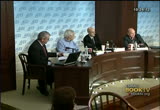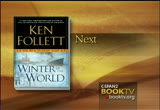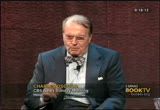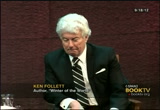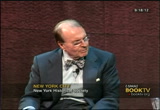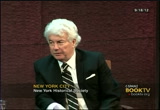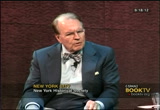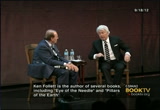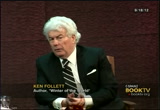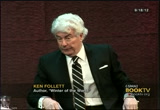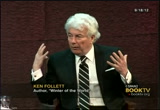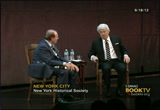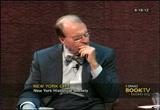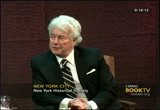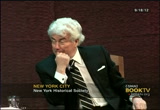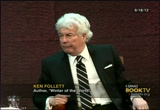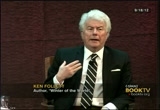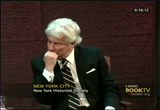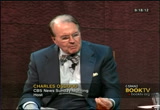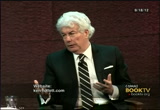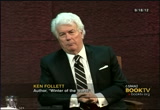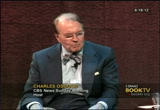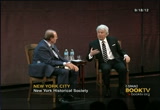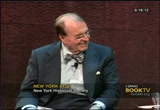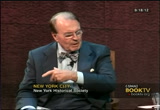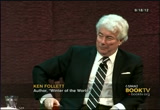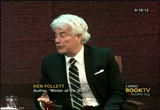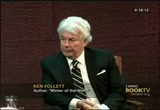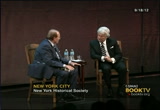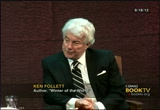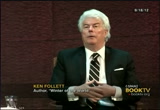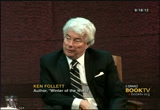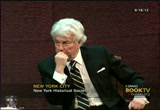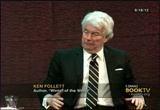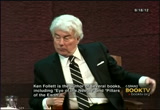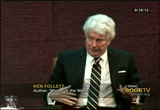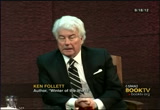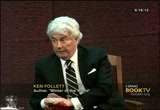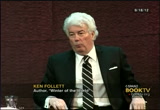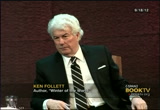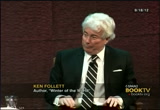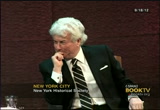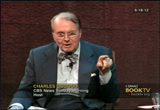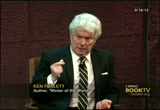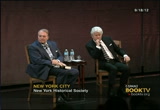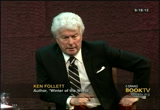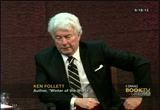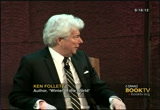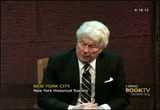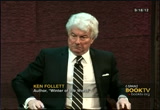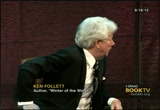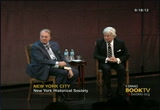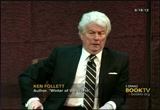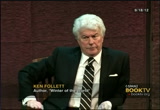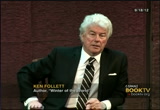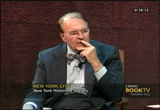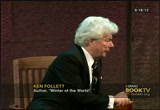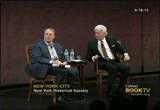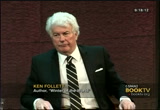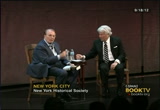tv Book TV CSPAN December 25, 2012 3:15pm-4:15pm EST
3:15 pm
outstanding book in thank you for all your questions. there will be more chance informally. there's a reception outside we invite you to join us. hope you'll buy the book and have the autograph it. thank you on much to you and to our commentators. heart mark >> historical novelist said to focus on five families, american, english, german, russian and welsh as they traverse the political landscape with the second world war. this is just over an hour. >> thank you and good evening.
3:16 pm
you and i have never met until 10 minutes ago, but i have to say i feel as if i know you after so many years of reading your terrific books. you've given me and most of the people here tonight tremendous pleasure. as i think one critic from your book said being able to get lost in a wonderful story and come out days or weeks later feeling as if you've learned something. so you do both things i appreciate what you do so much. to make something like an historical trilogy. that is tiny little pieces. i learned on the cbs and is issued to journalism.
3:17 pm
is that true? >> is close to the truth, yes. my first job was university reporter in the south with echo, which is my hometown newspaper. and it worked for the london evening news and it is true that my car broke down and they couldn't afford to get it fixed. i went to the bank and ask them i needed 200 pounds which was at a lot of money in those days. i has to think for a long and they said no. the colleague on the newspaper of course we are all very interested when we asked the question, how did you find the time to write it. i got 200 pounds. and i went home that day and managed my first wife and said i know how were going to get the car back.
3:18 pm
she said he. but i did and i read it very quickly. it was goodness and i got 200 pounds for it. the car got fixed and i thought well if i try a little harder, spend a little more time on the next one, maybe it will be better. in fact, i wrote 10 books before i had success. >> imagine. that's very encouraging to people. to know that if your first 10 books don't sell, that's okay. but i think it says something about your determination. >> mulish obstinate sea. they think it is a fact that because a lot of people start writing a novel, particularly
3:19 pm
journalists have a novel in the jury. when you start writing your first novel is a new experience you get the names and say you have brown eyes and then you get to page 50 or 100 probably nobody's ever going to read this. when i got to that stage, i thought the heck with that. i'll finish the thing. they have that streak of obstinate sea this is now going going to finish it. >> in the news business were discouraged from making things better. and of course you have to make everything out.
3:20 pm
[laughter] >> almost everything. ever since i is benito, the first book i researched. i was born in 1949 so i have no memories and so i had to find out what everyday life is like during the war for people in the u.k., which is for the story of a set. so i researched it and never sent then i realized that that works for me to write a novel, but with a factual background that is very much imparted in the story and it helps me to get the book a kind of texture. it's not everybody's way, but interweaving the fictional story of their side effects have been the way this worked for me. >> if you're going to use research for book is one thing if it takes place. as i have been elected.
3:21 pm
a book such as this one, which takes place in so many different places, can you go to those places, do you go to those places? >> i prefer to visit any place i write. "winter of the world" takes place in cities that are familiar to me. london, washington, berlin. event is petersburg into moscow. but a few places i haven't visited us got a chapter about the development of the atom bomb and a lot of that took place in new mexico and in particular was very exciting true story of espionage down in new mexico. santa fe apparently is crawling with fbi agents. everybody knew because they were all wearing tweed jackets.
3:22 pm
but anyway, there is some serious s. ganache going on, so that's great drama for me. so i just like to walk around the streets. i find that very helpful. >> i wondered when i came to the mirrors entry materials and buffalo issue actually went to buffalo. >> i went a couple of times to buffalo. the other thing is buffalo features than 100 years ago was a very different place from what it's like today. nevertheless i went there in the round, but i got a hold of old maps and the buffalo bluebook, which was the list of high society in town and at
3:23 pm
newspapers published at the time and so on. go in and walking around is never enough. >> give you a feel for the place. >> and doing research is one thing if it's your own research, but are you able to do all of your own research and a book like this? >> i have to do it myself. other people wouldn't know what i'm looking for. and he finds old works on the maps and photographs and sometimes people interview, but i interviewed them myself.
3:24 pm
i've never been able to let somebody else do that because a novelist is that in for specific things. it's hard to sum up what i'm looking for, but it has to do with germanic event and telling details and so on. so i do it all myself and i normally spend six months to a year doing the research and planning of the novel before i start chapter one. >> you really have to do a lot of preparation. so once you start writing, do you do it in sequence? >> i do it in sequence. it's difficult enough to keep the whole novel in my head. if i started writing siano
3:25 pm
seekers to get so confused. >> the actors to shoot out of sequins. i don't now they manage it. >> you had the advantage since your stories are told against the backdrop of history that actually happened, if you do want to make sure that history is brilliant. >> faq, so that's part of the reason for the research, but also as a kind of backup, would have written the first draft, i hired historians, best i can find them may have they read the first draft and look for mistakes and i paid them and i paid him quite well because i want them to take it seriously. major academic historian is not that expensive, but still. i want them to take a week to
3:26 pm
read my but carefully and to check facts because they don't have all the information in their head. what that means won a writing the first draft i can be a little bit free if there's some information i can find. i can make a dress out of 10 feel confident that if i've guessed wrong, at least one of my historians will find out. >> do sometimes lose track of your characters? if you have this many characters, the book is extending over three volumes that there may be something you would forget about. >> i forget more fundamental things, then make a spreadsheet.
3:27 pm
that's how i do with this problem. so every time i introduce a new named character, i put it in the spreadsheet with the characters age and of course the spreadsheet will calculate the age throughout the chapters, saving me a little bit of arithmetic in my paste in any descriptions. if i see she had red hair green eyes, i paste them into the spreadsheet so next time i need to describe her, you can read my myself of what she looks like and make sure you six-pack of the same phrase to describe her again. >> you have to remember that 20 to 34 years -- >> i've got to calculate the age. >> when you're talking about a certain person in the dialogue
3:28 pm
takes place and is seen as evolving in your mind coming to keep the reader in mind all the time quick >> i think about the reader all the time. what they believe this could happen? will they be interested? will they care? and what they want to know what happens next? i think about that all the time. i once had a conversation with a friend of mine who's a different kind of writer, a british writer code and make sure she. i was talking about what readers like and what they expect and he said i never think about the rigors. said that's why you're a great writer and i'm a rich writer. [laughter] [applause] >> i think that makes good
3:29 pm
sense. i feel the same way music and it's so hard to listen to it. so sad to not write this music for the people. i write it for myself. >> there are a lot of writers who think that way. a lot say i write what i think is good and if anybody else thinks it's good and read it i'm very happy about that, but that's not my target as it were. so i respect that, but definitely isn't my way. i always wanted to entertain people. i find the way you slowly learn things over the years about yourself, i'm a bit of a song and dance man. i like to make people laugh and give them a good time and it's always been my approach with writing. >> and when you think of way
3:30 pm
about your readers come in the will also care about the bookmark. you write page turner's and you have to give them some resent what they want to turn that page, push the button or whatever you do because you're asking him quite a lot. you're asking them for their attention for quite a long time. >> esn or something else. i'm very conscious of the fabulous range of alternative forms of entertainment and i want them to turn off the tv and stop playing computer games and i want to pick up a slightly old-fashioned thing called the book and i want them to use the literacy skills in their imagination because there are no pictures in my books. they have to make the pictures.
3:31 pm
so i'm very conscious i have to give people something they can't get, particularly on the television. i think what that is, what that can be for me is a depth of understanding that you would never get. you're a television than yourself, so i hope you won't be offended rightist. television the words come quickly, so we get more information and more insight than we can get from the tv show. that's probably what we have to offer people to get denture reader books. it's a bit richer than we can get from this wonderful alternatives. >> and radio i say at the end of my television broadcasts, i'll see you at radio because in some ways radio is more colorful and
3:32 pm
picturesque than television because it is that the mind. you engage a person's mind and they make your pictures, which are bound to be closer to them, but a book is another direction. >> you're right. the somali thing. you do a little of the work yourself. >> some of the characters in your books are ones that you didn't make. and by the way, it's very thoughtful of you at the beginning of the book to list all the characters because occasionally you go back and see who's this? there's a thing about recognition that keeps you moving, too. this is that same person that i met before.
3:33 pm
you have five families to have five different countries, but they seem to move back and forth or their children do. >> yeah, i thought that was important. i didn't want to reify parallel stories with your who's going through the war of the revolution and experienced in things but never meeting. it would be kind of like a dramatized history book. so i wanted them to meet and interact. i had to select people who move around. for example, there are two brothers were fact three workers since the petersburg at the beginning of the story, but they split up and eventually becomes a gangster and the other stays
3:34 pm
becomes a revolutionary in the red army. so i looked for ways in which they are starting their country. and meet because i thought that would make a much better story. >> do you like some of your characters and dislike others? i mean, they are all your fault. >> is true. i generally quite like all of them, even the ones who are unkind or foolish agendas like them all. although there's the occasional exception. this was to make them shades of gray rather than black and white. i'm not sure whether that is right. i like the characters that are real ogres. the villain that people talk to me about my than any other is
3:35 pm
william hanley and there is nothing good about it at all it is embedded in a word this care dear. people talk to me about it and say why didn't you kill him earlier? i wasn't going to kill a character that could earlier in the book here that would've been a waste of resource. so i've mixed feelings about it. occasionally it's great to do a character who is 100% e-mail. -- evil. >> once you do not invents, the prime minister's and chancellors analysis people, since you are not responsible, you're permitted to like or dislike them without feeling guilty.
3:36 pm
>> is coming astray. and of course there are tremendous balance, especially in "winter of the world," like stalin you don't need to have any sympathy for. when i have real-life characters in the story, i have to be careful because honestly, you can't treat the real-life character as he retrieved a fictional character. i can't haven't do or say anything i like because he is a real person and what happens to be true to the character, what i try to do is use the actual words, when a real historical care are like fdr has a conversation with fictional characters, i try to put it in cities actually said in some other context, any speech or
3:37 pm
memoir or newspaper story. i've seen in the fall of giant, were phased, the conservative aristocrat meets the prime minister at a dinner and he berates prime ministers david lloyd george. he berates the prime minister. this is the 1920s and there were two from moscow going around a person and preaching communism and making fiery speeches and even giving money to newspapers. says to the prime minister, you shouldn't allow this. you should send these people home. phished expel them from our country. whitchurch says the more the british people know about communism, the less they like it. communism is best viewed at a distance and he wants the russians to tour the country
3:38 pm
because he's quite sure that every day they speak they are turning more and more british workers off the whole idea. i'm not saying everything that whitchurch says actually comes from a memo he wrote at the time because people were genuinely seemed seemed to him, you've got to expel these russians and he wrote a memo. and that conversation is the worst from the memo instead of in a written form. so that's the way i try to preserve the two city of a historical character even in interactional action. >> lenin returns to moscow from exile and people turn out to see one in. this guy gets off the train in the spring a business suit and they are looking for this fiery,
3:39 pm
dressed like a worker. you keep it going for a while and you're still waiting to get off of the train and then he says something to somebody. this was left. i thought that was a great piece of business because it just meant you don't always get what should expect. talking about a character everybody supposed to know. >> monday made a long journey to st. petersburg to the station where he made that speech and while he was in sweden, the swedish communists.net close. out of the goodness of their heart because he arrived at the finland station looking like a bush vote, which is mildly embarrassing. >> yes, that's a true story.
3:40 pm
>> i have to ask you this, but do you ever -- are there are days that go by in the place he would write that you say that's what i'm going today. >> i never do that. i have good days and bad days, but on a bad day every something knowing they can fix it tomorrow. right from the start i was aware or they feared that if i let myself wait for inspiration it would never come. i would always write something just because 225 seemed to me that the richer tradition. this probably comes from my up bringing in having work ethic are meant to me about that kind of thing. but i don't know many writers
3:41 pm
for inspiration. even people have bad boy reputation of staying up all night, if you say the one-time usurper in the morning, they say 9:00. i don't think you could write a novel if you didn't follow some. >> how many hours is a writing day? >> i'm writing these books now and i don't want to leave too many years between the books. i don't want people to forget who i am. i like to start early, so i generally start at 7:00. i get up and go to my desk in the bathrobe with a cup of tea and i usually write until 5:00 and i do that six days a week. and if i get behind schedule at
3:42 pm
work on sundays as well. i never work in the evening. i'm not very creative in the evening. einstein early in the morning. i go to restaurants with my friends. >> you do have apparently a very full life. children can set children, grandchildren they actively participate in their lives. so the fact you have all these children suggests that the very great. yet other characters to create, don't forget that. so tell me what the place looks like. the character in amadeusis a visit to the site studio in the site is not they are and sitting
3:43 pm
in the room looking around saying, so he's looking for some explanation for how he does this thing that he does. so priests tell me whether signings look like. >> i also made reference books and it's easier to google them look it up. i still like the feeling and i have three homes and there's a library in each one and that's where i work. i work at a computer. i like to type back in the 70s. in my house i have my house i have a little collection of drawings on the wall which i quite enjoy, a trying out
3:44 pm
aliphatic, which is one of those things that picasso did, where he cut his face in a few lines, like five lines. obviously very quickly and it's a miracle. so i have pictures of people who are better writers than i am who encouraged me to try harder. >> they looking over my shoulder saying do that again, father. >> speaking of doing it again for me to do a lot of rewriting? >> when i started the morning, i always change it. i can always think of ways to improve it. sometimes i'm lucky if that happens, but sometimes i read a couple chapters and bigots the
3:45 pm
wrong approach in the back and do it again. >> back to square one. >> back to square one. i do a lot of that. nowadays if i feel lazy, then i remember there's about 5 million people waiting for this book and if i do something a little sloppily, they'll know. 5 million people will think that chapter wasn't up to his usual anders. he must've fallen asleep. >> so they look over your shoulder, too. >> it's very important to me. those people who ensure a book of mine, i want them to enjoy another one. even if i'm tempted to skim comments in the end i always rewrite it. >> you think of the history background which are doing as background which you want your
3:46 pm
readers to get something out of the events taking place and have a sense they might not have had before of what it would be like to be there quick >> i do want that, although it serves me as well. i get a lot of inspiration at the pleading stage or spend a day working on the poet and realize there's a hole in my knowledge and then begin a book about some aspect of what i'm writing about and that will fill the gaps, but also give me a kiss from her dramatic scenes because like most authors i'm looking for something dramatic. i read something in the newspaper or see something on the tv. i think we probably all do that. >> when you're writing turns into movies or television series, when you see those things, do you feel as if they
3:47 pm
didn't get it right or is it up to the producer or director to depict it as he or she sees fit? >> you see, a screenwriter and a direct or tell the picture and i tell in words and it's a different skill. they don't change it because it's smarter than i am. they have to because there are scenes in a book that won't make much sense when it's told in a movie, so they have to change it. and they do it that way. it's a big thrill to see good actors on the screen, doing the things that i wrote. that's a big thrill. and of course, you bury your head in your hands and say how
3:48 pm
awful. that sometimes happens. >> where you play in cameo role? >> they never even -- [inaudible] [laughter] this very interesting, very good education. i was on the screen for 15 seconds it took about about half a day and that's not including the time i spent in costume and makeup. the effort that goes into making movies and television drama is just terrific. i was lucky around the senate and i thought it was him for weaving. this is just a prop, didn't appear in the story. but it was a 12th century
3:49 pm
limb. not a change century by century, a technology by developed and i happen to know this is not an 11th century loom or 13. it was the 12th. there might be six people know what to know that, but someone working on the film do it and got that exactly right. that kind of thing is very impressive. >> are you tempted to be in any more of these things? >> i like the clamor. it is a privilege to work with one of the stars and i felt honored and i learned about. i i learned, for example, that she can't act if you're trying to remember your lines because then you say your lines with
3:50 pm
outlook on your face, what comes. if you're going to ask in a 152nd book you have to know your lines automatically. i do know that before, so i learned a lot. but no, i'm not tempted to do anymore. i'm going to stick to what i'm good at. >> you've got some work ahead of you. how is the third look at the trilogy? >> well, i finished "winter of the world" at christmas so i've been working since then and have completed the outline and has about 100 pages. it starts at the cold war. two events in 1961. one is the building of the berlin wall. i have made german family. they live in the central district of berlin and when the work is a government they are in
3:51 pm
east berlin and they're stuck of course. that was the point of the wall, you couldn't get out. although many people died trying to get out and some people did escape, so that's part of the drama, escaping from east berlin. the other thing in 1961 is here in the united states is the freedom we. people got on buses in washington d.c. and wrote this up with a reciprocated and refuse to play the rules in accordance with the supreme court. they are very brave survey dear, a young man on the bus and his mother says to him, those people are going to kill you and he discovers that she's right. i'm sure many people the audience will remember that in younger people full of hurt and
3:52 pm
i found reading about this death the courage of people who had studied the kantian notion that if you're unjustly attacked, the best thing to do is to do nothing. some of these people just do their only apparent to the the punches or kicks and i have found it to a quickly moving to read about this death and i'm hoping i'm going to be able to bring that home to millions of readers. >> they show what the enemy really is. >> that's exactly right. that was their theory in a secret theory. but what i have had the guys to do the? >> you mentioned feeling strongly about history. does that help the writing on
3:53 pm
there something about it you want to convey? >> absolutely. i mean did we enjoy about the trilogy is that our emotions followed the emotions of the care nurse and that's an important thing. so her heart beats faster, our pulse races, we feel angry sometimes about what happened in the story were scared. some people say he was sitting on the edge of my seat. i don't know how often people read sitting on the edge of the seat, but those emotional actions to the story of the most important thing. if you don't have an emotional reaction to the book, it's easy to put it down, isn't it? even if it's well-written, if it's clever, might even be
3:54 pm
funny. if you're not emotionally involved in the peep hole -- people, if your emotions are the characters community keep on reading and that's what we all love. what i love as a reader and many people loved is the feeling of getting lost in the book so this story is more important for a moment in the real world that you live in. >> you have to read in solitude the solitary enterprise. it's probably better for the readers, too. >> i suppose so, although i started on newspapers. and if you work in a newsroom, you can't say come would everyone please be quiet because i'm trying to write. so i kind of never really -- it never bothered when kids walk in and ask me something.
3:55 pm
i don't like to take business phone calls during the day because then instead of worrying about the imaginary problems that may care errors, i start worrying about real problems come as we try to equate that unmask my publishers to call me after 4:00. but if it's something to do with my family or some in the, i don't mind the interruption. i have grandchildren living with me at the moment. my grandson will often come in to show me the model of the dinosaur. this is a brekke of stories, he gets bored and i go back to the book. >> james durkin wrote t. would like to take a shower and think about your errors in the book
3:56 pm
and occasionally his wife would come up to a whisper and say stop writing. >> that's very good. but i don't do it at parties. i enjoy parties much too much to think about my book. but i do nothing in particular on my mind, i was think about that seeing eye. >> one of the things were going to do now is to take questions in the audience. i'm sure a lot of you have your questions. this is being recorded, so something i was told when i first got into broadcasting is talk into the microphone. there are microphones on either side. if you have questions, that's the place to ask them.
3:57 pm
that way the audio will show up on the tape. and we can do that pretty much any time. my vision is not good to see whether that makes their authority. >> mightiness jim kucinich. i began by fans about the time your nato landed on the british course. my question is, can you differentiate the style of writing you apply to writing for newspaper as opposed to the style you apply for writing a novel? >> yes, that's a problem and when i started writing novels, which have even shorter articles and newspaper readers want the facts, one, two, three come before. there's a particular style versus briskets possible.
3:58 pm
one of the reasons my early books were not bestsellers as they were written in that style and it took me a long time to unlearn the newspaper style and to develop a style that is more appropriate. it's a more relaxed style, but it's also more detailed and more flowing. it's not so staccato. "eye of the needle" was the first book in which i managed that. it's a pretty brisk book. it rolls along pretty fast. but it's not referenced and that was the point at which i managed to make a change. you are quite right, i did find it difficult. >> my recollection goes back many years. at least one of your books to base primarily in iran and another primarily in afghanistan i wonder if there's anything taking place today is in any way
3:59 pm
4:00 pm
democracy. that did come true. i wasn't surprised when things went so bad in afghanistan. actually match some of those people too, the mujahedin. for some reason some of them came to london and somebody who knew i was interested invited me to meet them and that did not include my opinion, did not improve my opinion. the other book you are referring to was a true story, my only nonfiction book which was about ross perot and his employees who were put in jail during the iranian revolution, an adventure story across the country and also those revolutionaries at first appeared to be on the side of freedom but when they got into power like so many revolutionaries throughout
4:01 pm
history they were more impressive than the people who preceded them so tragically, no surprise, i wish there had been. >> thank you. i was just curious as to whether in your research you had come court across any changes because so much youth over the past few years, electronic surveillance, the spy business or by governments which had really changed the political reality radically -- various subjects. >> i haven't done much about that kind of thing but the reason is during the years of the recent incredibly quick technological development i have been running about the middle ages and the -- i was able to kind of escape from having to deal with all of that sort of stuff but i am sure you are
4:02 pm
right. the kind of intelligence that comes from technology is now very important. i don't know if it is superior to human intelligence or what you get from spies but there is more from electronic surveillance that i think it is probably taking prominence. if i ever do another contemporary spy story i have to get into that stuff. >> what book that you haven't written has influenced you the most and when you come to manhattan what the you do here? thank you for coming. >> the most important book in the english language is the king james bible. hy grew up in a very religious family. i am not a believer. as an adult i have never been a
4:03 pm
believer but my parents were born again christians and they read the bible every day and as a young teenager i read the entire bible. the language, leaving aside all talk of religion and focusing on the words that are used in the king james translation, first of all, it is fabulously well written and secondly, so many of those phrasess and rhythms have entered into all of our minds, all of us whether we have ever read the bible or not we know those frayss and we used them and i think i am probably every other riders in the english language has been influenced by the king james translation more than by any of the book. what i'd like to do when i come to manhattan, actually the same as what i do in london. i like to go to restaurants with
4:04 pm
my friends. >> i read the -- "eye of the needle" and on the wings of eagles and i thought they were both superb. your comment about boy george and communism put something in my mind. have you come across any similar conversations between franco and hitler as to why franco did not declare war on the allies after having accepted so much aid from the not seize and if so could you put me in that direction? >> i have never come across such a conversation and i can't remember an account of the two men meeting although i suppose they must have. when did they meet? >> hitler i think visited franco in madrid in the 40s. >> i have no idea what might
4:05 pm
have been said but clearly it was a disappointment. i just think franco was smart. he had won. joining in the war he had nothing to gain and everything to lose. after all, if spain had joined the axis powers, it would have been defeated and would not have been a fascist country until a 70s. franco made a smart decision. the minute he did it would have been better if he made the opposite decision and maybe he was smart enough to know that. >> thank you. >> humble before the man. >> 9 a myth christine and it is an honor to hear you speak. i have a son, douglas, who finally turned off the tv and in the 3 players and picked up your book a number of years ago.
4:06 pm
it truly hooked him on reading. on his behalf and mine as a parent, i am curious to see what was the genesis of going from thrillers to historical fiction and including -- i am happy that you have a strong woman in each of your historical fiction. [applause] >> i was interested -- i used to look at cathedrals because of how beautiful they are and how serena in atmosphere a cathedral is but i very quickly became interested in how they were built. when you look at one of those european cathedrals you do think, how did medieval people get those enormous thoughts?
4:07 pm
not that i. know mathematics for constructing cranes and so on. and become interested in -- i became interested in the society produced the great cathedrals and the question on my mind, it strikes everybody, why are they there? why did medieval people want these enormous, costly buildings? i became fascinated by that and quite early on when i was struggling to make it as a writer i have a go at writing a novel about building a cathedral. i felt very convinced it was a great popular novel to be written about the building of a cathedral. in 1976 i wrote a few chapters and an outline and send them to my agent who is sitting right here in the front. he didn't like it at all.
4:08 pm
and he was right. and he said you are writing a tapestry. you are writing a tapestry and what you need is a series of linked melodramas. the truth of the matter--and he was right about that -- the truth was in 1976 when i have only been writing fiction for three years i wasn't capable of writing a novel about the building of a cathedral and i had another idea which was to write about a german spy in england who discovers the secret of the d-day invasion so i wrote "eye of the needle" and ten years later i went back and still thought there was a great popular novel to be written about the building of a medieval cathedral. i went back to the idea after another -- after ten years as a professional full-time writer writing stories all the time, my
4:09 pm
skills were better and i was able to write the novel i had conceived so long ago and i wrote another outline and he said it was good. direct five? there we are. he must have said the first one was okay but could be better. >> i heard you one time talking about rejecting a book of yours and told you that the characters had no past and therefore it would not sell in the united states and your comment was not telling you -- probably the right model. >> we have time for just one more question. >> my name is berenson. i am retired doctor in new york city. i will ask you a very personal question and i hope you won't
4:10 pm
mind. in your ridings or subsequent have people come up to you and said i have changed my life because of what you wrote? i think that most people who write or do things or whatever it is, they want to note inwardly if they have had an impact on someone's life. >> i can't think of an instance in which somebody said quite that to me. sometimes a book resonates with a person very strongly because of something they are going through in their personal life at the time. if they are going through a tragedy and a book somehow helps in deal with that, they will write to me and tell me about this and say thank you for your book because it helped me through this, but it is all little puzzling to me because i am not thinking of that when i
4:11 pm
am writing the book and never quite sure how it has helped somebody. but that does occasionally happen but i can't remember anybody saying i change their lives. i would be very flattered by that. why do you ask that question? you must have a reason for that? >> i think most people whether they are raising children or they are teaching or practicing law or convenient position or going to africa have a feeling that what they are doing is going to change someone's life even if it is just one. i think writing is a wonderful way to do that. >> thank you. >> we have time for one more question. >> my name is warren graham. a disclaimer. i am a graduate of the
4:12 pm
university of buffalo. you talk about dealing with a real character, i was very much can -- i recently read it, your treatment of a young churchill in the man from st. petersburg and how richly developed that character and wondered what your sources were. >> if you want to write about churchill, the amount of material is enormous. there is loads of stuff. one of them--one of the most famous people in history. if there is any difficulty it is not finding material but shifting the week from the chaff. he wrote a great deal himself and i think you get the most vivid sense of the character from his own riding, the kind -- the majestic prose, the clever words, the way he will switch,
4:13 pm
he will start a rather ponderous sentence and end with a very nifty line. all that kind of thing gives you his strength and weakness. his strength was his eloquence and his weakness was he tended to think that was enough. he drove his political colleagues matched that way. they sometimes said when he had made a good speech he thinks he's solved the problem. sources very near -- i am glad you enjoyed the portrait and he has appeared in many of my books and is one of the most interesting real life characters you could possibly imagine. >> we have time for one more. >> very quickly. what are your favorite books
4:14 pm
going back to the beginning of literature? >> i read a lot of nineteenth century fiction. that is what i enjoy most. i like stories in which decisions made by the characters and the actions they take change the course of events, change the plot. that is the traditional shape of on novel. if i do read contemporary literary novels in which this doesn't happen, and then i get irritated with them, so of course i right in the nineteenth century tradition and actually most of the people on the best-seller list right in that tradition as well. most readers still enjoy an old-fashioned story in which people are confronted with problems and struggle to solve them and the things they do make a difference on the outcome.
176 Views
IN COLLECTIONS
CSPAN2 Television Archive
Television Archive  Television Archive News Search Service
Television Archive News Search Service 
Uploaded by TV Archive on

 Live Music Archive
Live Music Archive Librivox Free Audio
Librivox Free Audio Metropolitan Museum
Metropolitan Museum Cleveland Museum of Art
Cleveland Museum of Art Internet Arcade
Internet Arcade Console Living Room
Console Living Room Books to Borrow
Books to Borrow Open Library
Open Library TV News
TV News Understanding 9/11
Understanding 9/11